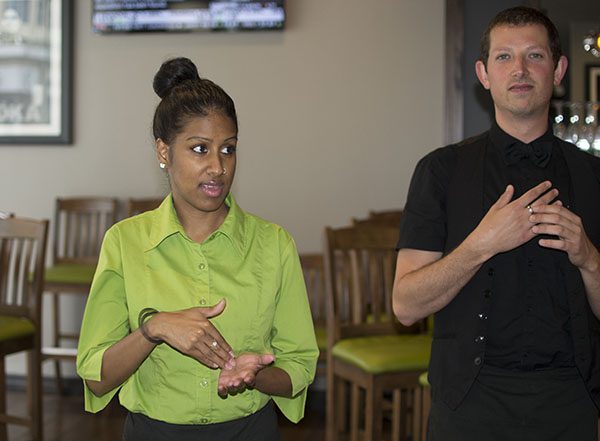It’s not everyday that you walk into a restaurant with an empty stomach and leave having learned a new language.
At Yonge and Wellseley, Signs opened its doors in July, with a unique dining concept. Diners should expect to place their orders in American Sign Language (ASL), as the restaurant is staffed with people from the deaf community. The menus display images of the orders in sign language to help customers communicate with their server, and learn something new as they order.
Restaurant manager, Rachel Shemuel, 38, says the response has been overwhelming by the hearing and Deaf alike.
Aside from the novelty of the experience for customers, Signs implicitly draws attention to a greater social issue involving Deaf employment.
The Canadian Association of the Deaf, in fact, states on its website that no credible census has ever been conducted on the deaf community. However, the association estimates there are “350,000 profoundly deaf and deafened Canadians and possibly 3.15 million hard of hearing Canadians.” A 1998 study showed 41.9% are under-employed; and 37.5% are unemployed.
According to the association, deaf unemployment is in part caused by “systemic discrimination.”
Alexandrose Dayment, 27, who is deaf and a server at Signs says it’s a problem.
“Hearing people sometimes look at deaf people like they can’t do anything, they’re not able,” Dayment said. “They criticize them because … it’s hard for them to develop the experience and the skills they need later to get other jobs.”
Another deaf server at Signs, Chadni Sugrim, 24, who holds a college degree in business, says Deaf people need more accessibility.
“We need interpreters for meetings so that we can be part of a meeting,” she said.
Shemuel comments that it’s just the same as having an interpreter in a business meeting with Chinese clients.
Chadni points to the need to bridge a gap in communications such as calling in for interviews through Skype, Facetime, and other visual messaging means.
Shemuel recognizes this need and routinely sends video logs instead of emails to staff members reviewing each week’s service.
Signs hired 36 deaf staff, who occupy positions as hosts, servers, cooks, bartenders, and dishwashers. The restaurant continues to receive overwhelming employment interest with Shemuel receiving four to ten applications a day.
Customers walking away from the restaurant can’t help but reevaluate their notions about disability.
“The Deaf community do not appreciate the title ‘special needs’ or ‘disability,'” Shemuel said, “They don’t have a disability. They just speak a different language.”
The restaurant has plans for expansion in other major cities such as Montreal and New York, as well as to branch out to include other businesses including a cleaning company.

